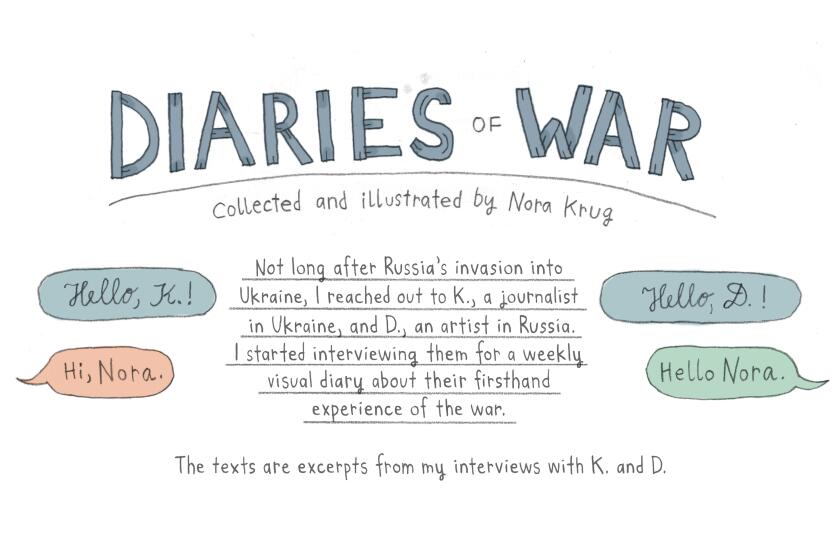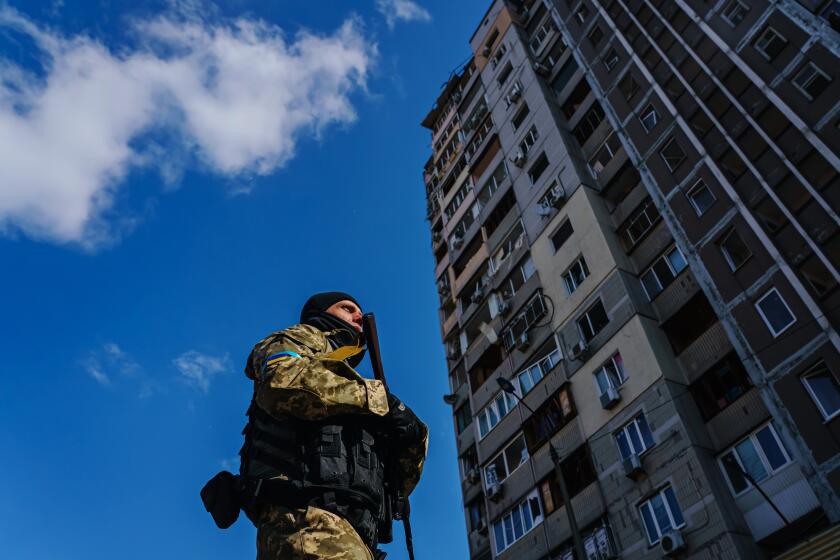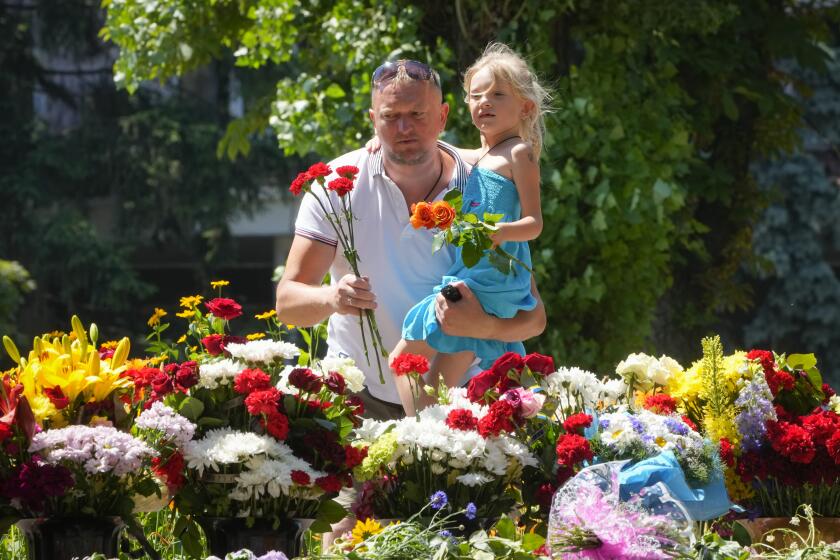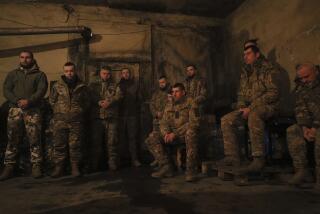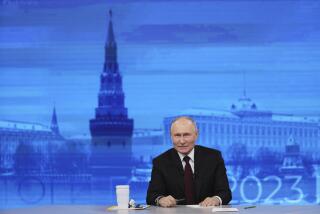Op-Ed: What game theory can tell us about the war in Ukraine
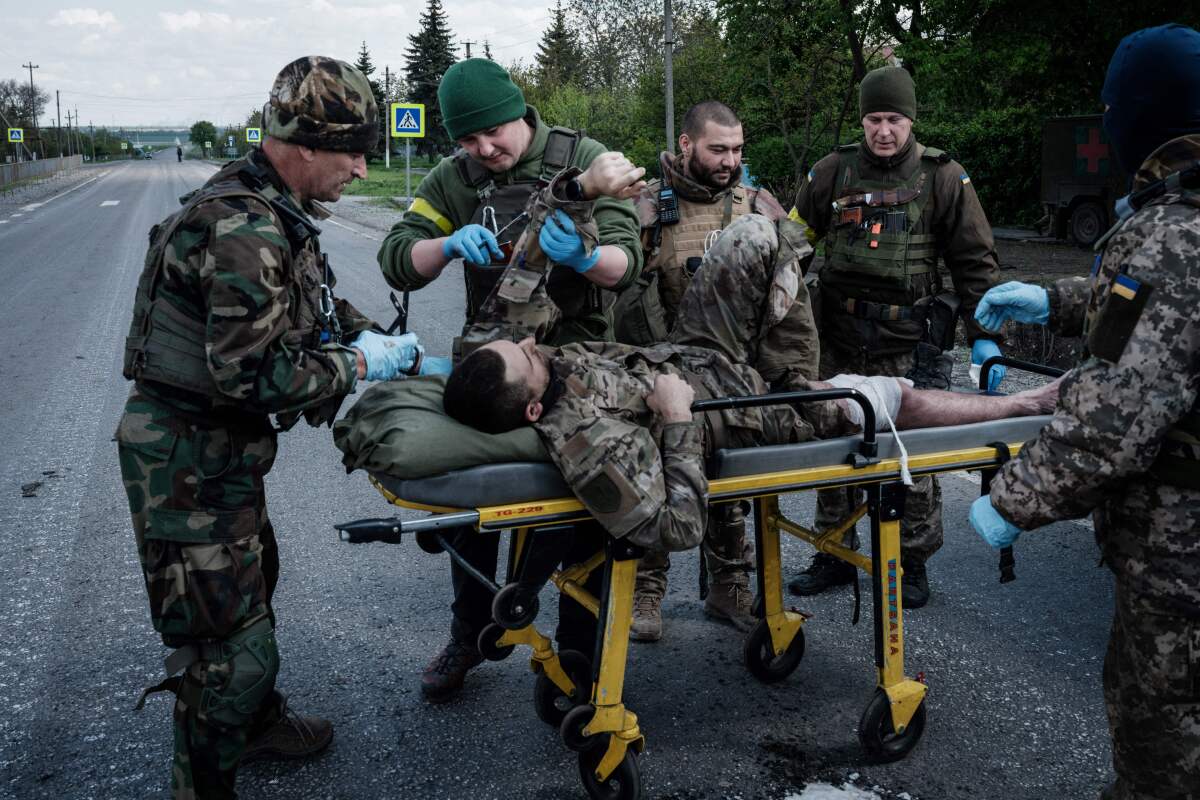
Russia’s invasion of Ukraine is five months old, and no clear end is in sight. As the invasion turns into a long-term war, it’s time to think strategically about what can be done now to manage and contain the threat in the future.
As economists specializing in behavioral economics and game theory, we teach strategic concepts from game theory to our business students. The same ideas can help us understand Russia’s current moves, predict its future behavior and derive the best strategies to achieve long-term goals.
A key concept in game theory is “backward induction”— looking ahead to the potential outcomes that may arise in the future (the so-called game tree) and then working backward to determine what the optimal actions are for each party to take today.
What does the game tree look like in the next phase of Russia’s war in Ukraine? Russia launched its invasion at the worst possible time from a military logistics point of view, during Ukraine’s infamous muddy season. But after an initial retreat from Kyiv, Russia has made slow but steady gains in eastern Ukraine, and conditions will be ideal for Russia in the coming winter months. The winter season will also be a time of strategic vulnerability for Europe, given its reliance on Russian natural gas for heating.
From this perspective, time is on Putin’s side. Anticipating that his best chance for victory may come this winter, Putin has an incentive to withhold Russia’s natural gas now and push Europe into the most precarious possible position economically, regardless of the short-term costs to Russia.
D. talks about neo-Nazis in Russia and remembers his friend who as killed by them 17 years ago. K. discusses antisemitism in Ukraine and Putin’s false justification for the war.
What does this imply for the alliance of countries supporting Ukraine’s independence? Clearly, the way to induce Putin to stop his war of aggression now is to make him believe that there is no way that he can possibly win six months down the road. And the way to make him believe that he cannot win in six months is to move more than enough heavy military equipment into Ukraine even sooner.
This brings us to another important lesson from game theory and behavioral economics: that beliefs play a critical role in determining how each party will act — even when those beliefs are not 100% correct. In the context of Russia’s war in Ukraine, there is only one reason why the invasion continues: Vladimir Putin believes that Russia may emerge victorious.
Russia’s war in Ukraine has been described as a “war of attrition” — where two adversaries vie for a valuable asset, and each incurs a cost while their struggle continues and must decide how long to keep struggling and when to give up. Beliefs are extremely important in a war of attrition. When both sides have equal resources and equal determination to win, a war of attrition can continue for a very long time, inflicting massive losses on both sides.
However, if one side in such a stalemate can persuade the other that it will never give up, then the other side has an incentive to back down immediately in order to avoid wasting its resources in a fruitless struggle. In a war of attrition, the real game is therefore often one of psychology and competing resolve, to project one’s own strength and endurance and believe in the other side’s weakness.
Handicapping the outcome would amount to strategic malpractice. But we now know how the road to peace must be built.
Putin has thus far failed to project an image of overwhelming strength, but his disdain for the West and his belief in our weakness and irresolution are well known. Although Putin may be wrong to underestimate us, his error ironically strengthens his hand in the current conflict, as it gives him the hope he needs to continue the fight. Unfortunately, this means that peace in Europe will not be restored until the West shows the kind of strength and resolve that Putin does not expect.
Beliefs are also the key to strategies surrounding escalation. Some people fear that providing Ukraine with advanced weapons systems will anger Putin and lead to a ladder of escalation that could potentially even result in nuclear war. This is a legitimate fear, but here too we need to think through the full game tree. Does Russian escalation diminish when we contemplate appeasement? Not necessarily. It is in exactly that sort of situation, when Putin sees a path to victory but needs the West to stay out of it, that he would benefit from making extreme threats or escalating to signal his seriousness. If, on the other hand, Putin can be made to believe that the alliance against him will remain strong and committed no matter what, his potential benefits from escalation erode significantly.
Finally, consider what will happen if we don’t do enough to help Ukraine defend itself against Russia. There are two possibilities here. The first is that NATO will be drawn into direct involvement. If Ukraine’s manpower declines too much, there may not be enough skilled Ukrainian fighters left, and NATO weapons will need to be operated by NATO personnel, assuming the West doesn’t capitulate entirely. The potential for escalation would arguably be far greater in this case than if Ukraine is armed faster.
The Ukrainians are the ones fighting and dying. It must be up to them to decide when and how to settle with Russia.
The second possibility is that Russia takes Ukraine. This would leave Putin in a stronger position, with Ukraine’s land, industrial production and natural resources (including food and energy) in Russia’s hands. What will Putin’s beliefs look like in this branch of the game tree? If we allow Russia to take Ukraine, will Putin be emboldened to expand further, say by attempting to invade Lithuania? Will he expect his threats of nuclear escalation to continue to provide unstoppable leverage?
Even if Putin is wrong to believe that he can continue conquering the lands of Ancient Rus, letting Ukraine fall gives him ample reason to entertain such incorrect beliefs — and puts Europe at risk of continued confrontations. The actions of the Baltic states, from their provision of weapons to Ukraine to Lithuania’s stance on Kaliningrad, reveal their beliefs on this. They know that they will be far from safe if Ukraine falls.
To avoid nightmare scenarios next winter and beyond, the alliance must act now to strengthen Ukraine’s defense. Only when Putin has no hope of victory in Ukraine will peace in Europe ever be secure.
Anastassia Fedyk is an assistant professor of finance at the Haas School of Business at UC Berkeley and co-founder of Economists for Ukraine. David McAdams is a professor of economics at the Fuqua School of Business at Duke and author of “Game-Changer: Game Theory and the Art of Transforming Strategic Situations.”
More to Read
A cure for the common opinion
Get thought-provoking perspectives with our weekly newsletter.
You may occasionally receive promotional content from the Los Angeles Times.
